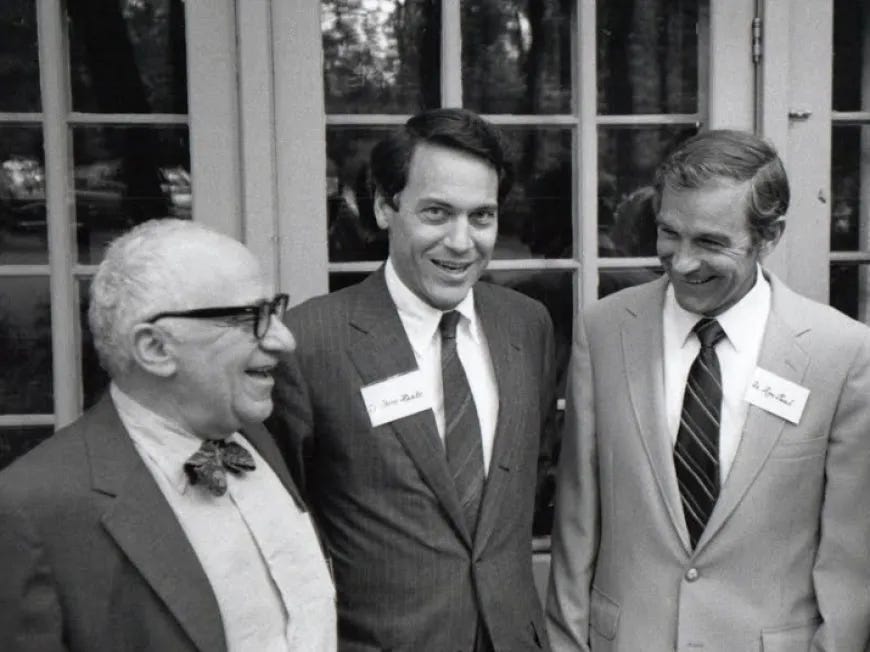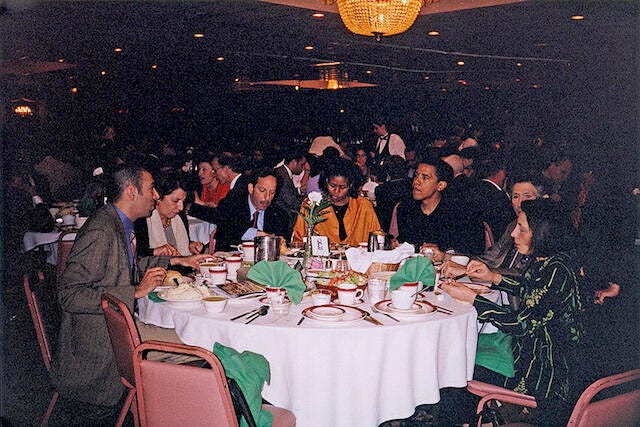Links for February 2025 (#1)
Why I am a woke radical, too much information about the Cato Institute, and the history of lint.
On Substack
1: I’ve enjoyed reading
at the blog Exasperated Alien. He ranks up there with Daniel Larison and Van Jackson as one of the best foreign policy Substacks. See his reflection on “Biden’s most forgotten crime,” the theft of $7 billion in cash reserves from the Afghan central bank in 2021, and his writing for Responsible Statecraft and Defense Priorities.2: On Groundhog Day, I suggested that the quality of people’s dreams ought to be morally considerable.
let me know he wrote an EA Forum post on the topic long before I had ever thought about it.3:
, co-founder of FarmKind, co-wrote an EA Forum post about the Compassion Calculator, which estimates how much someone would have to donate to an effective animal charity to avert an equivalent amount of animal suffering as caused by their diet. After wrote a post linking to the calculator, at least 29 people made donations and 22 made new monthly donations, raising over $7,000 and helping nearly 2 million animals, including 15,000 non-shrimp. I’d like to reiterate my standing offer that anyone who makes a new recurring donation of at least $25 per month to the EA Animal Welfare Fund or a FarmKind or Animal Charity Evaluators recommended charity and sends me a receipt will get a free year-long paid subscription to the blog.4: Many EA charities are competing in Project for Awesome 2025, a charity video contest each of whose top 30 winners receives a significant grant — last year it was $37,000. You can find a list of effective charities in this EA Forum post and vote for as many as you like by February 19. According to the author:
Every vote is incredibly valuable! In 2024, a total of 72,702 votes were counted, meaning each vote was worth approximately $15 on average. With the extended voting period this year (a full week instead of just a weekend), it’s likely that the total number of votes will increase.
5: The incomparable
told me about Maharishi Vedic City, a town in rural Iowa founded by followers of the Transcendental Meditation movement. To my surprise, the population in 2020 was 84.5% white and the median age was 67.9 years. In 2012, Oprah Winfrey traveled to nearby Fairfield and toured a meditation center. She called it “America’s most unusual town.”6:
also has reviews of the Church of Scientology and the Nation of Islam, which he attempted to enter but wasn’t able to because Caucasians aren’t allowed in.7:
calls himself a woke conservative. He is woke because he’s concerned with injustices done to the global poor, animals, and people in the far future, and conservative in the sense that he believes our institutions, having been developed through an eons-long process of trial and error, deserve the benefit of the doubt. I personally consider myself a woke radical, or at least a woke iconoclast. The difference is that I don’t believe our institutions are selected for how good they are from the point of view of the universe, but how well they promote the values and interests of whatever class determines what institutions we have. Since this class is necessarily limited by our moral circle, we should expect institutions to be systematically blind to the interests of those outside the circle. I’m sure Bentham would agree with this when it comes to the obvious examples —like factory farming — but I don’t think we should be so confident about everything else. We’re probably living through countless ongoing moral catastrophes, and even though I think things like capitalism and constitutional government generally promote good outcomes, I’m not confident enough in that assertion that I think we should let them off the hook without first methodically examining their potential consequences and entertaining radical alternatives.8:
suggests the only valid principled reason to set the voting age at 18, 16, 12, or anything else is to increase the political power of actors you think are going to do good things and hurt actors you think are going to do bad things. I agree, having grown up a radical libertarian and a fan of Rothbard’s Anatomy of the State and never having understood why democracy is supposed to be so great in principle. You could make a similar argument specific to the U.S. political system about primaries versus caucuses and the Electoral College. Caucuses are less accessible than primaries and have far lower voter turnout, but they favor more grassroots-driven and ideologically extreme candidates like Pat Buchanan in 1996, Barack Obama in 2008, Ron Paul in 2012, and Ted Cruz and Bernie Sanders in 2016. In at least three of those cases — 2008, 2012, and 2016 for the Democrats — I think this was probably a good thing. I don’t care nearly as much about whether a few thousand people get to fill in a bubble and receive an “I Voted” sticker as I do about whether the next president is going to bomb Iran or deregulate factory farms.9:
writes that nothing is natural and even if it is, we shouldn’t care. I only ever took one philosophy course in college — environmental ethics — and this was basically the conclusion I came to. As you might expect from our World Gone Woke™ this made me the most vocal (and possibly the only) non-ecocentrist out of a few dozen people in the class. Also check out Silas’s article “States Don’t Have Special Obligations to their own Citizens.”Party Like It’s 1992
10: When California Governor Jerry Brown ran for president in 1992, he supported replacing income taxes and payroll taxes with a 13% flat tax and a 13% value-added tax. Brown was running as a left-wing economic populist, but the proposal would have raised taxes on the poor by nearly 20% of their income and cut taxes on the rich by half. Brown also positively cited Milton Friedman as a supporter of the plan.
11: Ross Perot’s 1992 presidential campaign was arguably the single greatest PR coup for putatively small-government populism over the past half century. At a cost of $61 million, he managed to get 16.5 million Americans to tune into a 30-minute infomercial about his balanced budget plan. Ironically, other fiscal hawks since Perot have spent far more than Perot did while achieving even less in terms of their desired outcomes. America’s foremost fiscal restrainer think tank, the Peter G. Peterson Foundation, has practically nothing to show for its $1 billion endowment and $40 million annual budget besides a few research papers and the sad specter of Simpson-Bowles.
12: I recently revisited Pat Buchanan’s (in)famous “Culture War” speech at the 1992 Republican National Convention. What’s most striking about it is the only major issue Buchanan mentions that Republicans haven’t since given up on is abortion. As Richard Hanania put it in 2021, even though the maximalist pro-life position is widely unpopular with the public, activists managed to turn it into a litmus test for Republicans because pro-lifers were (as they saw it) uniquely motivated to save millions of unborn lives.
13: In 1995, Buchanan took a left-wing turn. A supporter felt it necessary to clarify to the New York Times: “I’m no socialist, God knows.” In November 1995, after Buchanan took to TV to denounce Republican plans to reform Medicare, David Frum wrote for the Washington Examiner:
In an increasingly conservative America, one political figure defiantly resists the historical tide. This man still denounces big banks and multinational corporations. Still unabashedly puts the interests of the American factory worker ahead of those of the so-called international trading system. Still refuses even to contemplate any cuts in the generosity of big middle-class spending programs like Medicare and Social Security. This man is Patrick Buchanan: America’s last leftist.
14: The Bob Dole 1996 presidential campaign website is still online. Among other things, you can download the below wallpaper image of Dole to show your support for the campaign. This is the actual size of the image as I downloaded it from the website.
The Rationality of Being a Freakin’ Loser
15: I wasn’t aware of the Zizian cult — a LessWrong offshoot founded by an aggrieved, mentally ill émigré of the AI safety community with bizarre ideas about consciousness — until I happened across an article about it earlier this month. On January 20, two Zizians killed a Border Patrol agent in Vermont, apparently the sixth murder linked to the cult since 2022. The anti-“TESCREAList” reaction has been predictably unfair:
[W]hen you read about how “Rationalism” plays out in its communities in practice — the “movement” starts to feel a little less STEM and a lot more New Age: A suspect program for self-improvement, with existential stakes, a strong emphasis on self-experimentation, and a deleterious commitment to openness. In this sense its predecessors are not really the original enlightenment rationalists, but the dubious touchstones of ‘60s-hangover California — Scientology and Dianetics, Werner Erhard and est, the Symbionese Liberation Army and the Manson Family.
In reality, it’s not clear whether the Rationalist community or so-called “TESCREAList bundle” has a greater incidence of violence than the population at large. The Zizians are a tiny splinter group with virtually no influence over the movement, and some prominent Rationalists have been sounding the alarm on them since at least 2019.
16: Meanwhile, the right is calling Zizianism a “radical leftist vegan trans cult.” My impression is it’s probably more accurate to attribute Zizian violence to their animal rights philosophy than their idiosyncratic interpretation of Eliezer Yudkowsky’s decision theory. But to blame it on either is incredibly stupid.
17: Yudkowksy, the founder of LessWrong, is also the world’s most prolific Harry Potter fanfiction author. This review of the 660,000-word Harry Potter and the Methods of Rationality offers some pretty biting criticism that ought to hit close to home:
[T]he only character trait worth anything in the story (both implicitly and explicitly) is intelligence, and the primary use of intelligence within the story is manipulation. This leads to cloying levels of a sort of nerd elitism. Ron and Hagrid are basically dismissed out of hand in this story (Ron explicitly as being useless, Hagrid implicitly so) because they aren’t intelligent enough, and Hariezer explicitly draws implicit NPC vs real-people distinctions.
18: The godfather of much modern International Relations theory and the foremost exponent of the theory of structural realism, Kenneth Waltz, once remarked: “Everyone, of course, thinks his own theories realistic.” I have this quote printed on a t-shirt — see below. I suppose you could say everyone thinks his own theories rational as well.
Libertarian Infighting (What’s New?)
19: The Cato Institute appears to have replaced Eric Gomez, a non-ideological military strategy expert, with Brandan Buck, an avowedly libertarian historian whose dissertation is on right-wing opposition to U.S. foreign policy. Buck has previously written for the anarcho-capitalist foreign policy commentator Scott Horton’s Libertarian Institute website and Antiwar.com.
20: About two years ago, Cato fired longtime foreign policy staffer Ted Galen Carpenter over disagreements about the war in Ukraine. Similar to Buck, Carpenter’s dissertation is about the foreign policy tradition of the Old Right. After he was fired from Cato, Carpenter became a senior fellow at the Libertarian Institute and the Randolph Bourne Institute, Antiwar.com’s publisher. He has since written several articles critical of what he sees as Cato’s insufficiently principled libertarian position on Ukraine, NATO, and Gaza, and delivered a speech at the Ludwig von Mises Institute decrying “The Liberty Movement’s Pro-War Fifth Column.”
21: In 2006, Carpenter told libertarian journalist Brian Doherty, in an interview for Doherty’s court history of the American libertarian movement, Radicals for Capitalism, that he believed the sort of unconditional opposition to military force espoused by Antiwar.com was “idiotic,” since “the minute one voices that kind of policy option, you don’t just marginalize yourself — you take yourself out of the debate entirely.” In 2001, Carpenter had deemed it “imperative” that the United States invade Afghanistan. In 2002, he proposed invading Pakistan to root out members of al-Qaeda and the Taliban who had slipped across the border.
22: The founder of Antiwar.com, Justin Raimondo, was an ally of Murray Rothbard and founder of the Libertarian Party Radical Caucus in 1979. Among its core beliefs was:
Land Reform — Because of past land theft and original claims not based on homesteading, many landholdings in America are illegitimate. The Libertarian Party in cases of theft (for example, from the Native Americans and chicanos) should support restoration to the victims or their heirs and in cases of invalid claims should advocate reopening the land for homesteading.
The Radical Caucus newsletter, Libertarian Vanguard, praised many avowedly socialist Third World revolutionary movements including Nicaragua’s Sandinistas.
23: In 1982, when Texas Republican Congressman Ron Paul was considering a bid for the Libertarian Party nomination for president in 1984, Raimondo and the Vanguard declared that Paul was:
a defender of the Social Security system; a bulwark of the CIA; a crusader against freedom of the press, world peace through world trade, and disarmament negotiations with the Soviets; a propagandist for the bloody and brutal dictator [Anastasio] Somoza [of Nicaragua]; a champion of welfare payments to veterans; and a stalwart in the New Right’s assaults on the liberty of gays and on women’s right of choice on abortion.
Rothbard averred that no one “except the goose-stepping devotees of the Crane Machine” (referring to Ed Crane, then-president of the Cato Institute) would even consider Paul for the nomination. Five years later, in 1987, Rothbard argued that if the Libertarian Party did not nominate Paul, it would mean the death of the party. In 1992, Rothbard and his ally Lew Rockwell encouraged Paul to run for president against George H. W. Bush and called him “the most important and most persuasive political standard-bearer for liberty in our generation.” In 2008 and 2012, when Paul actually did run for president as a Republican, Raimondo was among his most enthusiastic supporters.
24: In the half-decade after Cato’s founding when Rothbard was still on staff, it was putting out some pretty radical stuff. This includes the glossy magazine Inquiry, edited by Rothbard ally Williamson “Bill” Evers and aimed mostly at the post-Vietnam, post-Watergate left. It included articles by the likes of Noam Chomsky, Eugene McCarthy, Marcus Raskin, and Walter LaFeber. For some reason, the only place you can find an online archive today is the white nationalist website Unz Review.
25: From 2015 to 2020, Mises Institute fellows Tom Woods and Bob Murphy hosted a podcast called Contra Krugman, where they reviewed Paul Krugman’s New York Times column every week. They also had an annual cruise for people who hate Krugman, the Contra Cruise. (On a related note, if anyone would like to organize a cruise for people who hate Thomas Friedman, I’d be the first one to buy a ticket.)
The “War on Terror” Is Worse Than You Remember
26: In 2009, Osama bin Laden recommended three books that he thought every American should read: The Israel Lobby by John Mearsheimer and Stephen Walt; Palestine: Peace Not Apartheid by Jimmy Carter; and Confessions of an Economic Hit Man by John Perkins. The first and second are thoroughly researched; the latter is a fabrication. You can probably guess which one is the most popular.
27: NPR interviewed Walt, a political scientist at Harvard Kennedy School, after his work was named to Bin Laden’s reading list. Walt said:
Osama was making a point that lots of other people have made, including, you know, official reports by the U.S. government, like the 9/11 Commission and the State Department’s Advisory Group on Public Diplomacy. He was making the point that America's unconditional support for Israel and that combined with Israel’s occupation and repression of the Palestinians is a major grievance throughout the Arab and Islamic world. And it’s one of the reasons that he was inspired to attack the United States 9/11. It’s not his only grievance by any means, but it’s clearly been a key part of his agenda for quite some time.
28: However bad you think the “war on terror” was, it was probably worse. See this footnote from my post on the Ledeen Doctrine about post-9/11 U.S. security cooperation with ostensible adversaries:
Libya and Syria covertly received many terror suspects from the United States with the implicit understanding that they would be tortured. A Human Rights Watch report based on recovered documents and interviews conducted after the overthrow of Muammar Gaddafi in 2011 found that the United States not only delivered Gaddafi’s enemies to Tripoli, “but it seems the CIA tortured many of them first.” A former CIA case officer, Bob Baer, remarked to the New Statesman in 2004: “If you want a serious interrogation, you send a prisoner to Jordan. If you want them to be tortured, you send them to Syria.”
The United States also cooperated with China, detaining 22 Uyghur Muslims suspects at the Guantanamo Bay Detention Camp at China’s behest between 2002 and 2013. Most of these suspects were never charged with a crime. The Justice Department found in a 2008 investigation that U.S. interrogators “appeared to have collaborated with visiting Chinese officials at Guantánamo Bay to disrupt the sleep of Chinese Uighur detainees, waking them every 15 minutes the night before their interviews by the Chinese.” A U.S. Senate report, also published in 2008, found that many of the interrogation techniques used at Gitmo, including sleep deprivation, were lifted from a 1957 Air Force study describing torture practices used by members of the Chinese People’s Liberation Army against American soldiers in the Korean War.
29: The new secretary of defense, Pete Hegseth, deployed to Gitmo in 2004. In a 2005 interview with the Minnesota Star Tribune, he defended the treatment of detainees at Gitmo, saying: “We bend over backwards to conform ourselves to the detainees’ way of life […] especially when it comes to religion,” and “To be honest with you, I think their food is better than what my guys got.”
30: When Hegseth ran for U.S. Senate in Minnesota in 2012, he was endorsed by Bill Kristol, who spoke about him as a longtime friend. After Hegseth was nominated to lead the Pentagon, Kristol wrote (emphasis added):
I knew Pete Hegseth fifteen years ago when he was a young, pro-Iraq war veteran, moving in Weekly Standard/Project for a New American Century circles. He seemed to be an effective proponent of neoconservative foreign policy, and some of us wanted to think well of him and give him a hand on a promising career. I even weighed in (ineffectually) on his behalf when he ran for the Republican nomination for senator in Minnesota — against, as I recall, a Ron Paul-supporting America First type.
31: In fact, Hegseth lost the nomination to freshman state legislator Kurt Bills, who endorsed Paul and received Paul’s endorsement. Although Paul only won 27% of the vote in the Minnesota caucus and placed second behind Rick Santorum, his supporters packed the state convention, took 32 out of 40 national convention delegates, and dominated the party endorsement process. A reporter described Bills and Paul’s victory as a “bloodless coup.”
Barack Obama Obungler Ocrumbo Barfsack O’Biden
32: During the early Obama administration, some conservatives took to calling the president “Barfsack Ocrumbo.” This name has since been appropriated by the co-hosts and followers of the leftist comedy podcast Chapo Trap House, along with the far less inventive “Obungler.”
33: When Joe Biden was running for president in 2020, he sometimes referred to himself as an “O’Biden-Bama” Democrat. This is appropriate, as both O’Biden and O’Bama have notable Irish ancestry.
34: Every year, O’Biden Obungler Ocrumbo Obama has one of his interns assemble a list of his favorite songs, books, and movies. Last year, the former president “decided” that one of “his” favorite songs is the one Billie Eilish wrote about cunnilingus.
35: Throughout his career in public office, Obama struggled with his image as an arrogant liberal intellectual. Yet, he willfully admitted to the New York Times’s David Brooks in 2007 that he is an admirer of Reinhold Niebuhr. His staffers told the Times in 2012 that he is a student of the just war doctrine of Saint Augustine and Saint Thomas Aquinas. According to Obama’s memoir, he also read widely as an undergrad at Columbia in a futile attempt to get laid:
Looking back, it’s embarrassing to recognize the degree to which my intellectual curiosity those first two years of college paralleled the interests of various women I was attempting to get to know: Marx and Marcuse so I had something to say to the long-legged socialist who lived in my dorm; Fanon and Gwendolyn Brooks for the smooth-skinned sociology major who never gave me a second look; Foucault and Woolf for the ethereal bisexual who wore mostly black. As a strategy for picking up girls, my pseudo-intellectualism proved mostly worthless; I found myself in a series of affectionate but chaste friendships.
36: While at Columbia, Obama took a course in literary theory from the famed Palestinian-American academic Edward Said. While teaching at the University of Chicago, he became close friends with the Palestinian-American historian Rashid Khalidi. In 1998, Obama and his wife attended a Palestinian community fundraiser in Chicago with Said, Khalidi, and future founder of Electronic Intifada Ali Abunimah.
37: The New York Times article that pegged Obama as an admirer of Saint Augustine and Saint Thomas also revealed that the president directed the CIA not to count as a civilian casualty any “military-age male” killed or injured in a U.S. drone strike, unless overwhelming evidence later emerged to prove their innocence. This included boys as young as 14 years old.
38: Obama once joked about assassinating the Jonas Brothers to keep them away from his daughters, but if he had actually assassinated them, they would have been considered enemy combatants by default according to his administration’s policy.
39: Throughout his eight years in office, Obama authorized some 542 drone strikes in Pakistan, Somalia, and Yemen. The administration admitted that these strikes killed between 64 and 116 civilians, but independent observers put the toll as high as 1,100. As many as one in six people killed in drone strikes during the Obama administration were civilians misidentified as combatants. These included a 16-year-old American citizen who was the son of a senior al-Qaeda official and 12 members of a wedding procession in Yemen.
40: Amnesty International and Human Rights Watch investigated some Obama-era drone strikes in Pakistan and Yemen and determined that they likely constituted illegal extrajudicial killings or war crimes under international law, as they had recklessly failed to distinguish between civilians and combatants directly participating in hostilities.
If You’ve Made It This Far…
41: You deserve something fun. Here’s a totally AI-generated podcast I made as a joke on Monday. I asked ChatGPT to give me a 5-minute script about the history of lint and its role in gay nightlife in Appalachia, then ran it through Claude for editing and used ElevenLabs to generate the text-to-speech narration and sound effects. The only thing I had to do manually was splice together the audio clips, and that took about an hour.









I am very disappointed. I thought this blog was apolitical; endorsing Dole is unforgivable.
Anyway, after reading about Buchanan here, I don’t see how anyone could reject Caplan’s Myth of the Rational Voter. Almost every politician is populist. Even Milei has to have populist attitudes. Who isn’t to some extent? Justin Amash? That’s about it.
Younger people may not know this, but back when PCs were new it was common to use a tiled desktop background.